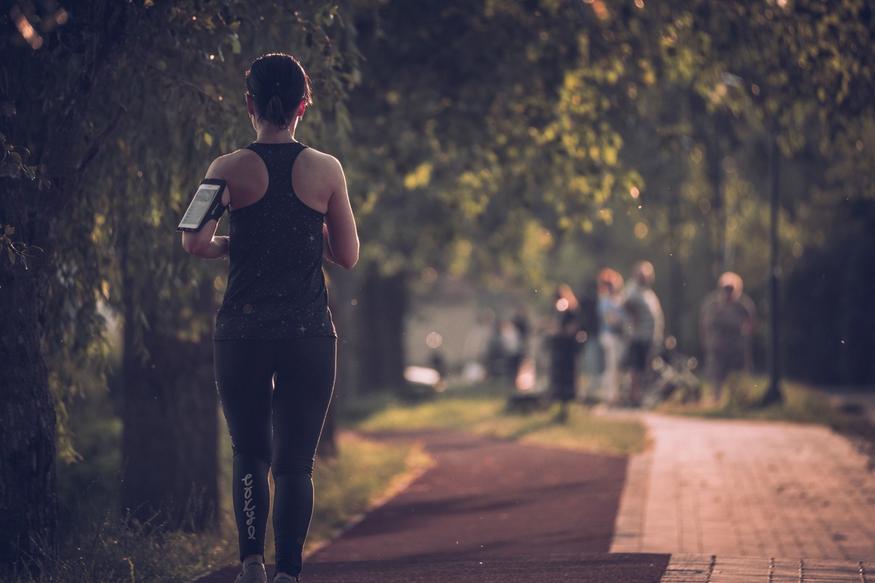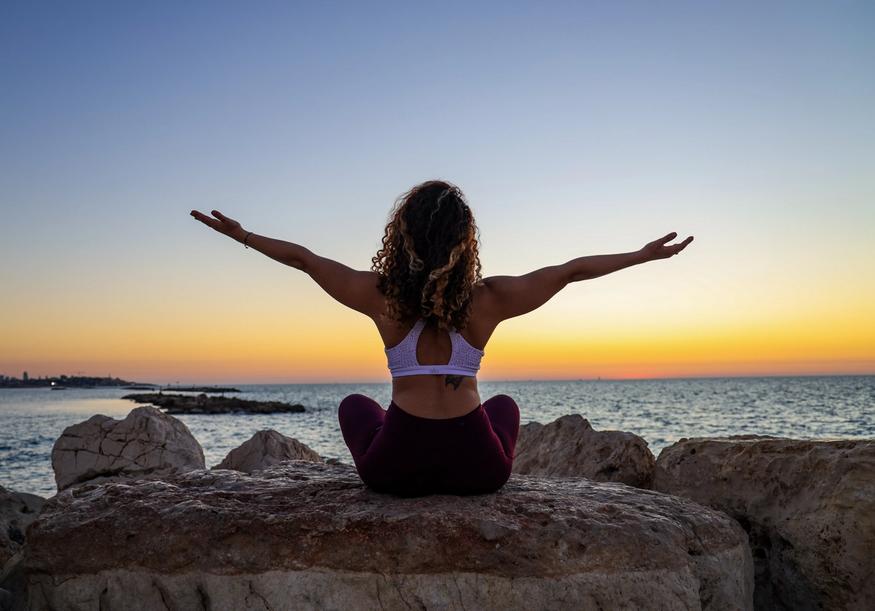Falling Back in Love With Exercise Post-Eating Disorder
Published on 8/27/2020I have been uncomfortable in my body for as long as I can remember. Pool parties spent looking wistfully at the other girls, who were skinny and barely even cared that they were in a bikini. Tugging shorts lower over my thighs, hiding under a t-shirt. I don’t know at what age I stopped loving my body, but I know the age when I began hating it and torturing it. I was fifteen the last time I ate a meal without hesitation, as I’ll never be able to forget the existence of calories again. I consider myself to be doing well, to have progressed from my eating disorder and furthering myself to the point of loving my body, but it isn’t as easy as it sounds. I manage to use my Fitbit without reverting to extremes. Exercise remains my biggest friend and foe. I constantly battle with it and the guilt it brings. You go through stages after your eating disorder, where exercise has a different purpose and with it brings a further relief. These are the stages that I experienced:

To be able to act normal
There’s a transition period that many ED sufferers go through. When you’re “fine”. You've deleted that dangerous calorie counting app. You’re eating decently well, and you don’t look as alarming, so everything thinks that you’re better now that you’ve recovered. Maybe you even think that. But even though you’re going through all the motions, your mind isn’t there yet. This isn’t a bad thing, it’s normal and to be expected, but it is something to be aware of. You’re still exercising to allow yourself to eat normally again. You’re using the ritual of exercise to permit the rest, as an excuse to keep going. Yet you’re “all better now”.
I like to look at it as a phase that you have to go through, as it is preferable to the one that preceded it. You’re slowly fuelling your body, you know what you were doing wasn’t good for you, but you haven’t managed to fall in love with your body yet. You still need to understand that your body is perfect and deserves to be fed and enjoyed. So exercise is the balancing act, to let you move on with your life. Try to start fighting these feelings of guilt; try to make the exercise you have to do something that you enjoy. Focus on a need to move rather than what burns calories. Try jogging outside instead of on a treadmill, where you can’t measure every step and calorie. Try going to classes where you’re not in control. Do yoga or pilates, and focus on your strength, not size.
To be mentally healthy
As I slowly released myself from the idea of exercise as a way to be skinny, I discovered that exercise was also cathartic for me. It allowed me to release my mind just for a moment, to be distracted from the depression and anxiety that still plagued me daily. I found this through running in the woods, allowing the songs to ease my mind. My runs stopped being about burning calories, and instead, they were about that glorious release that followed—the high of adrenaline pulsing through me. I wasn’t focused on how skinny my legs could become, but rather the strength of them below me, how they pushed me on.
This isn’t too different from the previous stage, except that exercise is released from the constraints of body size, even just a bit. It becomes a treat for your mind, and it starts to become fun. I wasn’t just doing burpees and sprints in the gym; I was learning how to squat, and try different machines. I was listening to podcasts and audiobooks. Missing a workout wasn’t a reason to skip a meal, but instead meant that I lost my cathartic time of the day. I would allow myself to go for a walk as a workout.
To be proud of myself
I was running more and more, and I decided to give myself a push. During my depression, it feels like my life was on hold. I needed something new, an accomplishment to show that I was emerging from the time that stopped. I signed up for a half-marathon, I bought a Fitbit, and it allowed me to kill my negative eating behaviours once and for all. I couldn’t be purging when I needed my body to take me 21km in a race. I began seeing my workout as a challenge, seeing food as fuel to help my body. For the first time, I would worry about eating enough, making sure my body had everything it needed. This was a stark difference to the life of restriction that had consumed me until now. I no longer looked at the calories burned at the end of a run, but only the distance and time. I was competitive with myself.
Exercise became about the celebration for me. It gave me small weekly goals that I could conquer, a reason to feel good about myself when depression whispered nasty things in my ear. I did it, I completed the half-marathon and it felt amazing. So amazing that I did it again two years later. And I hope to do a full marathon sometime soon.
To be healthy
This was the most challenging step to reach. I could see exercise in burning calories, soothing my mind or being fun, but I couldn’t see it in terms of health without linking it to body size. I could only view health as size because society had conditioned me to this. I have always been quite a healthy person, but this has been about weight, to ensure that I don’t get bigger and hopefully get smaller. I struggle to separate weight from health. I can do it on other people. I can see thick thighs on a girl and think she is gorgeous. I can see a plus-size yoga teacher and not question it, as I understand that weight is not health. But I can’t bring this rhetoric home for some reason.
Then I had an epiphany of sorts. I considered my naturally skinny friends, who often complain about how hard they find it to exercise regularly or how poorly they can eat. I had always been jealous of them. Watched them demolish junk food regularly and not remember the last time they went to the gym. But then I realised that I’d been gifted by having a larger body that puts on weight, that my slower metabolism is a longterm advantage. I had to learn to be healthy, in order to meet society’s ideals of how I should look. I knew that I couldn’t eat fries twice a week and never work out because I would see the result on my body. They didn’t, and so they struggle to be healthy. And while I now work to change this mindset into just health, the building blocks are already there, the habits and information are already stored in my mind. And so I eat oatmeal with fruit and nuts for breakfast because it’s delicious and healthy, but I let myself bake and enjoy cookies as well. I try to work out three times a week, but when I don’t want to, I go for a walk instead or a bike ride. Because my workout isn’t about sweat or calories, it is about doing something for my health.

Because I can
This feels like the ultimate phase of exercise enlightenment. I reached this phase as I was uncomfortably reminded two years ago how short life actually is. My grief forced me deep into my comfort of depression. I lost a lot of weight, people commented on how thin I was, some even made it sound like a good thing. It was what I had always wanted, and now I didn’t want it, it made me feel worse. I worked to get back into exercise, and I went to a new spinning studio as I had always loved spinning. My first class opened my eyes… spinning could be about something other than losing weight? The instructor never mentioned calories, fat or anything related to it. Instead, they spoke of goals, ambition, pushing yourself to achieve whatever you want to. They told me that I could do anything, and I believed them.
I kept going to the sessions, and now I’m even trying to train as an instructor. Because I finally discovered that exercise doesn’t have to be about weight or even health, it can be about the gift that is my body. About being grateful for my ability and privilege, and treating my body right. I feel sad about how long I spent hating my body, restricting it and harming it. I still look in the mirror and feel unhappy some days, but now there are many other days that I look in the mirror and feel grateful. That I wear an outfit and don’t think about my tummy bulge or thick thighs, instead I tell myself that I look cute. I will work out and do it because I can, because I am alive and able to use my body, and that is enough reason to.
Please be aware that there are affiliate links present in this article.
Featured posts

Fleur
Welcome to Symptoms of Living! A place where I like to relieve myself of the barrage of thoughts and ideas filling my mind. Here I'll take a look at various topics, from books to BPD, series to self-harm, there's nothing that we can't, and shouldn't, talk about.
Having struggled with mental illness since the age of 15, one of the hardest parts was how alone I felt in it. While mental illness is beginning to be discussed more openly, and featured in the media, I still think there is room for improvement. So whether it is mental illness or merely mental health, a bad day or a bad year, let's make this a place to approach it and strip it back. Everyone has their own symptoms of living, and you certainly won't be the only one with it.
Would you like to receive my top monthly articles right to your inbox?
For any comments/questions/enquiries, please get in touch at:
info@byfleurine.com
I'd love to hear from you!